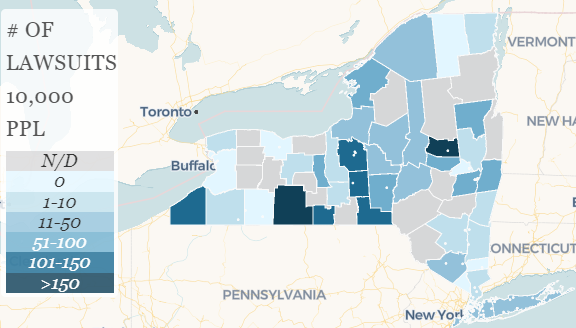New York’s Non-Profit Hospitals Sued 40,000 People from 2015-2019
Posted July, 20 2020 by Amanda Dunker

Between 2015 and 2019, New York’s hospitals sued 40,000 New Yorkers who could not pay their medical bills. Hospitals were unable to file new lawsuits against patients for a couple of months during the pandemic. However, a quick look at just the most litigious hospitals shows over 500 cases filed since courts starting accepting civil cases again.
A new map from the Community Service Society (with help from BetaNYC) shows where residents are most likely to be sued by their hospital. Residents of Fulton and Steuben County – areas where patients lack many choices about hospital care – are most frequently sued. In the New York City area Nassau, Suffolk, and Queens County residents are most frequently sued.
What can we do?
- Read the original report, which provides more data on the lawsuits, which hospitals filed them, how it impacts health equity, and describes measures that New York could take to stop these abuses.
- Tell your legislators to stop hospitals and debt buyers from taking collection actions against patients during the pandemic. S8365/A10506 would achieve this and more: it would stop interest from accruing on medical debt during the pandemic, permanently cap interest rates on medical debt at the U.S. Treasury rate from the current 9 percent, extend grace periods for insurance premiums, and stop late fees or credit agency reports against members who pay late premiums.
- Take action on CSSNY’s End Medical Debt campaign and increase support for the Patient Medical Debt Protection Act. The Patient Medical Debt Protection Act was introduced before the pandemic and already has with 34 sponsors in the State Assembly (A08639) and 18 sponsors in the State Senate (S06757). This bill does more to make hospital billing fairer for patients, including requiring a standardized itemized bill and stopping hospitals from charging unfair facility fees that are not covered by insurance.
There is an urgent need for New York to protect patients from unfair billing practices, and the Patient Medical Debt Protection Act does just that: We can’t take another 40,000 patients being sued before we fix this problem.
